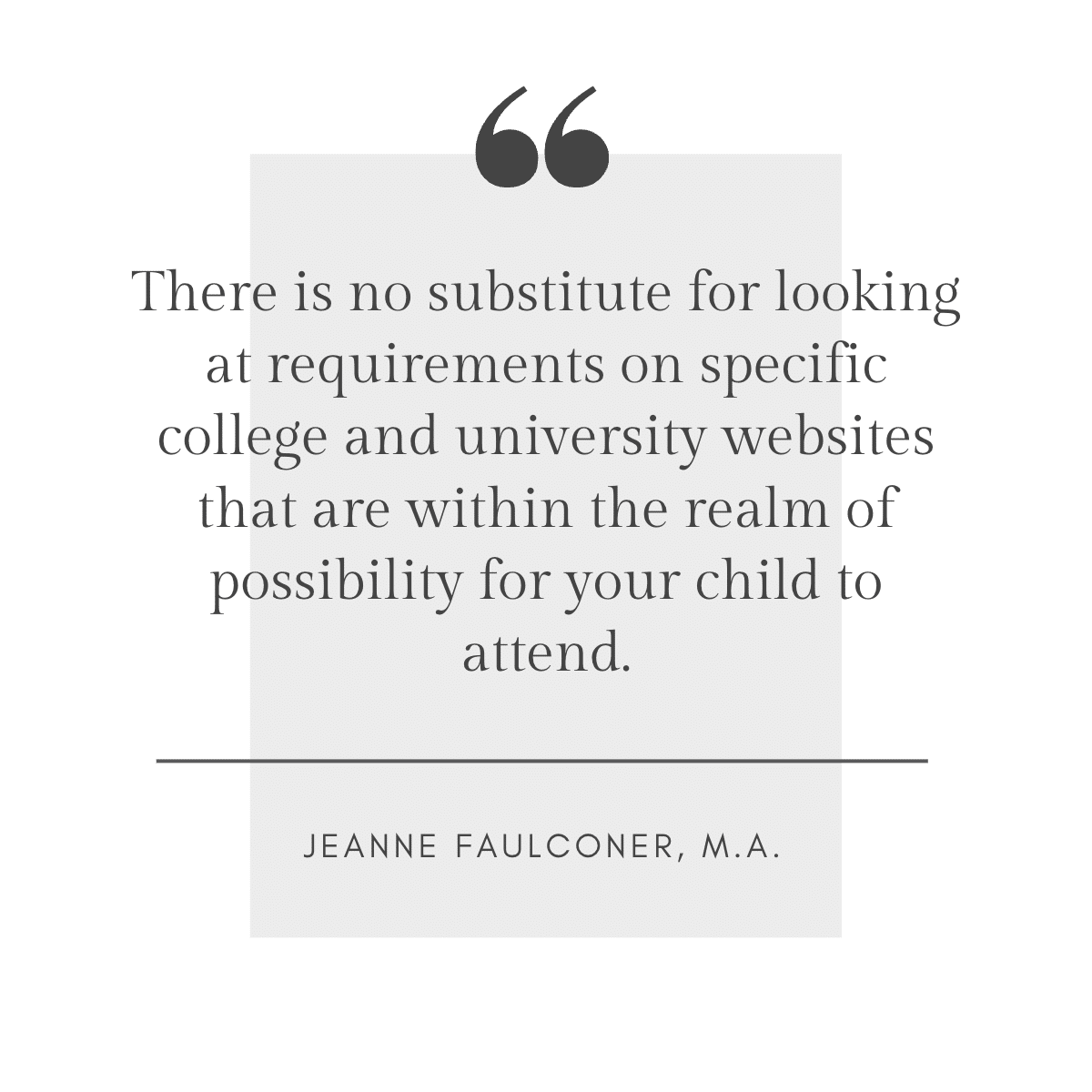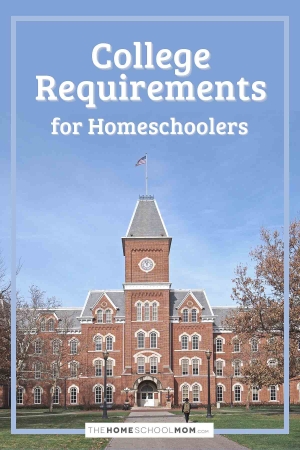Parents of homeschoolers on a college track need to know what the college admissions requirements are for homeschoolers and how they might differ from those for public or private school students (and yes, homeschoolers can get into college and do well). Let's take a look at what to expect.

Jump to:
Colleges want to see evidence of academic readiness
Courses and credits
The college admissions requirements at the top of most parents' minds are the courses (sometimes called "subjects") and credits (sometimes called "units") a homeschooled student needs to complete during their high school years.
Most U.S. states have no specific course requirements for homeschooled teens during their high school years. Course selection and completion are very big deals when you're in public high school, and even when you are homeschooling, colleges often have specific credits they want to see.
However, homeschooling is not public schooling, and homeschooling parents have wider latitude in what their teens should study, how they should learn, and what qualifies them for graduation or a homeschool diploma.
Homeschooling is governed by state laws which vary from state to state, and you should check with a homeschooling organization in your state to see if there are state course or credit requirements where you live. Find out how homeschoolers show they have met those high school homeschool graduation requirements, if any, in your particular state.
If there are no course requirements to homeschool high school where you live-as is the case with homeschoolers in most states-what should your child study and learn during high school, if college is on the horizon?
College admission course requirements Consult college admissions websites for high school course requirements. You can use their list of required courses and credits as a guideline for your teen's studies. For example, many colleges require the following number of credits (years/units) for admission:
- English - four
- science - three
- social studies - three
- math - three
- foreign language- two or three
- additional electives
You can get an overall list of commonly required high school courses at the College Board website or similar sites, but there is also no substitute for looking at specific college and university websites that are within the realm of possibility for your child to attend.

For example, this VCU Admissions page lists the required units (courses) for a high school student to be considered for admission to Virginia Commonwealth University.
We suggest you search online to find the course requirements at:
- several state universities in your state
- several state universities not in your state
- several private colleges
- highly selective and less selective colleges (harder and easier to get into)
- colleges and universities your child or teen has expressed interest in
Public high school course requirements
School division and state department of education websites will also show you which credits are recommended for college-bound public school students. Some agencies will show the requirements for general and advanced diplomas if both are offered in a particular state.
As a homeschooling family, you may not be bound by these public school requirements, but they give you an idea of the courses that schools require for their college-bound students. Understanding what admissions counselors are used to seeing in applications from public school students can be helpful to homeschooled applicants.
Many colleges have an admissions counselor who is the homeschool liaison or who otherwise specializes in homeschool applications. They are typically well-prepared to answer homeschool-related questions.
Accreditation and online schooling
Most colleges and universities recognize the independent nature of homeschooling and do not expect homeschooled graduates to have studied with an accredited institution. In fact, in many-to-most states, accredited institutions may be private schools, and their students may not be considered homeschoolers under many state laws-even if courses are completed online, remote, and at-home.
Using all-in-one online homeschool programs solely because they are accredited is unlikely to give students an advantage over well-prepared independently homeschooled students. In fact, students of online schools may lose the distinction of applying for admission as a homeschooler, which may be an advantage for competitive applicants.
A Virginia Tech homeschool admissions page states, "The university administration recognizes that students from educational backgrounds other than accredited schools may not study in the traditional classroom environment and that they are unable to provide the traditional documentation needed to evaluate their academic performance." Then the university provides a list of the documentation homeschoolers should use when applying for admission.
Read more about how an accredited homeschool curriculum is not something to worry about, so that's a concern you can drop!
Keep in mind that not all online schools provide academic rigor or good quality education, and some are not respected by colleges and universities. If you do go the route of online schooling, you'll want to investigate thoroughly, keeping in mind that accreditation is not a guarantee of quality.
(Using online classes, tutors and experiences to meet some requirements is not unusual for homeschooled students. This differs from enrolling as a student in an all-in-one online private or public high school).
How to earn high school credits to prep for college
You can earn high school credits through the following:
- Homeschool or public school high school curriculum
- Online courses for homeschoolers
- Documentation of learning that was not necessarily arranged as a course
- In-person classes, tutoring and co-ops
- Part-time enrollment in public high school (allowed in some communities/states)
- Taking a la carte classes as a non-degree-seeking student at your local university
- Concurrent or dual enrollment in community college or testing for credit
Sherene Silverberg has written extensively about free and affordable high school homeschool curriculum ideas and resources in her article about keeping college prep simple and inexpensive.
College applications have many elements
For all students, regardless of whether they are homeschooled or attend public or private school, there are additional college admissions requirements besides a transcript full of credits. Those requirements will include many of these:
- Application form
- SAT/ACT scores
- Essay
- Reading list
- Community service record
- Recommendation letters from a teacher, coach or mentor
- Resume
- Documentation of extra-curricular activities
These requirements are in place because colleges and universities want evidence-beyond parent-graded courses-that students are ready for college-level work. Be sure to check out our in-depth piece about more ways to provide outside evidence of college readiness.
More selective colleges have higher requirements for all students, including homeschooled students. To be admitted to those colleges means having a competitive application with all the extras.
Merit scholarships offered on a competitive basis by various colleges and universities will also have their own requirements. They may be more extensive than admissions requirements.
Some private colleges may be more flexible in their admission standards than some state universities. State schools may find more "standardized" students easier to understand and to fit into their "slots"-but not always.
College Confidential offers a detailed Admissions Timeline to help you plan the junior and senior year application activities for high school students who hope to attend a four-year institution as freshmen immediately following homeschool graduation. Students who plan to apply to university as transfer students are not bound to this timetable.
College admissions departments at regionally accredited non-profit colleges and universities will typically not ask to see the student's diploma.
For-profit colleges and some trade schools and vocational schools (cosmetology school, massage therapy school, for-profit tech or for-profit business colleges) may require submission of a diploma.
A GED is typically not required for homeschoolers to be admitted to college.
Online portals
Students can expect to submit all the elements of their college and university applications through a multi-step online form, which they often find at an admissions or applicant portal on each college website. These forms are designed to allow the applicant to save the form as they work, but it is a best practice to keep a local copy of any written content submitted in case of technical glitches. The process is stressful enough without having to rewrite a well-constructed paragraph or essay because it was lost without being saved.
Some institutions use their own internal system while others ask applicants to submit applications via the Common Application, usually called the Common App, an online portal used by many colleges and universities. The admissions office of the institution will describe the process on its website.
Most students have to pay application fees when they submit their application.
Official high school transcripts
College admissions departments will want to see an official homeschool transcript, including all units completed for high school credit, grades, and GPA. All pages of the transcript should include the student's name, date of birth, and (at a minimum) the last 4 digits of the student's SSN, but you may also wish to include the SSN or college ID number (if one was assigned during the application process) and date of birth on the front of the envelope. Visit our homeschool transcript page for full details about creating transcripts.
Parents should safeguard transcripts as part of the permanently accessible homeschool records they create for their high school students.
Homeschoolers may arrange transcripts by subject or year, but some colleges prefer them to be arranged by year. Janny Alvarado, an admissions counselor at Roanoke College in Virginia, says that Roanoke College prefers them by year.
Some colleges ask for course descriptions or reading lists for homeschool classes taken during high school, while others do not. Parents should keep real-time notes to document learning, so they can create course descriptions from their notes if they need to provide them.
Alvarado notes that while Roanoke College's application for homeschooled students is the same as non-homeschooled students, the school sometimes asks families to provide more information about courses than is typically included with the standard high school transcript. She says a detailed syllabus for each course and information about the grade equivalency is helpful to the Roanoke College admissions office and makes the application review process easier. Other admissions offices have indicated it is unnecessary, so check with your college's admissions office before creating and sending these.
Students who have credits and good grades from community college courses (or who have earned an associate degree and are transferring to a four-year college) are less likely to be asked for additional details about their homeschool studies.
Preliminary & unofficial transcripts
Colleges may request preliminary and unofficial homeschool high school transcripts online as a PDF when the student applies to college, but-and this may be unexpected-hard copy (on paper) transcripts will probably also be required, possibly later in the process. They should be submitted to colleges in a sealed envelope with the signature of the administrator or guidance counselor of the school across the seal. This is true even for homeschoolers where mom is the administrator.
Many large institutions are moving to a Self-Reported Academic Record (SRAR) as part of the student application. Students input their courses and grades into a standardized form via the SRAR online portal. If a student completes the SRAR or submits an unofficial PDF earlier in the process, the transcript is verified later in the application process or after admission.
Other transcripts
If your teen took or is taking classes for high school or dual credit at community college, private school, or public school through part-time enrollment, they will also need to request transcripts from the community college or high school be sent to the universities they are applying to.
SAT®, ACT®, and AP® test scores
More and more four-year colleges and universities are test optional.
However, some institutions may still require test scores from homeschoolers.
Other institutions continue to regularly expect these test scores from all applicants.
Before 2020, homeschoolers were commonly advised that colleges and universities may put more weight on standardized tests like the SAT & ACT for homeschooled applicants, especially those who seek admission as freshmen rather than as transfer students from a community college.
There is no current conclusive data on the impact of homeschoolers' SAT/ACT scores on college acceptance rates in this new era.
Often students who meet certain age thresholds (around four or five years older than the typical age 18 for college freshmen) do not have to submit SAT or ACT scores, and students who are transferring a certain number of community college credits with a certain minimum GPA may also be exempt submitting the test scores.
That said, students who are likely to do well on the SAT and ACT may find it to their advantage to submit scores even at test optional schools.
And, many merit scholarships are still tied to SAT and ACT scores even at test optional colleges and universities, so students need to consider all the angles as they decide whether to take SAT and ACT tests.
Test scores can be a good way for strong test-takers to demonstrate their ability. Homeschoolers will want to pay special attention to other ways to provide outside evidence of college readiness, especially if they are not submitting test scores.
Check college admissions pages and speak with college counselors to find out whether submitting SAT or ACT scores is required or recommended for your situation.
Some students even choose colleges to apply to in part based on their SAT/ACT testing policies.
SAT/ACT testing availability. These tests are limited to certain dates and locations. Sign up early and make sure the date you choose is well before the application deadline for the college.
All portions of an application (including test scores and official transcripts) are expected to be received by the deadline date, so if you choose a testing date within a week or two of the application deadline, the scores will not be received by the college before the deadline.
SAT/ACT score submission requirements. Test scores must be submitted to the college directly from the testing company. Colleges will not accept copies of a student's scores from any other source.
SAT Subject Tests. Some colleges used to require these extra tests for homeschooled students. They were discontinued by the College Board in 2021 and are no longer requirements for any students.
AP Tests. AP testing is only offered once per year (in May). Homeschoolers can contact the College Board to find a local school that will allow them to sit for the AP exams.
Other tests homeschooled high school students take for college credit or to show evidence of their college readiness, such as CLEP, may have their own deadlines for taking tests and reporting scores. You may have to make appointments with testing centers. Whenever you are homeschooling to earn college credit, make sure you plan well ahead so your college application will benefit.
For more information on getting college credits while homeschooling, see our article on homeschool dual enrollment and testing for credit.
New trend in college admission: direct admission
If all this sounds daunting, prospective college students might want to get started on their applications anyway. That's because there's a new type of admission (2023) called "direct admissions," which is being offered by some colleges. The Washington Post explains, "students who create an account and fill out enough academic information can get an offer from schools that want them even if the students haven't yet applied. In the most recent trial, 14 schools offered direct admission to 33,000 students . . . ."
It's far from a sure thing, but direct admissions targets students who may be most likely to have doubts about the whole process-students with more financial need and students who don't have other family members who have attended college.
Colleges may have extra requirements for athletes, artists, engineers & specific majors
A student who wants to be recruited as a college athlete needs to plan courses according to guidelines for homeschooled students at the NCAA Eligibility Center.
An artist, dancer, actor, or musician may need to be prepared for an audition or to present a portfolio, which may need to be built over several years, not just a single year.
Students who want to major in specialized areas may have to gain admission to a university and the "school" within the university that offers that major. For example, a university may ask only for "three sciences" for general admission to the university-but specify that one of those sciences be physics if a student wishes to also gain admission to the university's school of engineering.
You have to plan ahead for this kind of thing, especially if your child intends to pursue one of these situations or a similar situation immediately after high school, with admission to a four-year university as a freshman-or if your child hopes to attend a highly selective institution.
Accommodations require documentation of learning disabilities
Like students who attend public school, some homeschooled students have learning disabilities. They may need accommodations to complete high school or community college classes or to take SAT/ACT tests.
Once admitted to a four-year college, they may continue to need accommodations for their disabilities.
Parents are wise to begin documenting the need for accommodations at least by 8th grade because a student may need a paper trail showing the history of needing the accommodations. Because homeschooled students may be "naturally" accommodated through learning at home, parents may need to be especially intentional in setting up testing with an educational psychologist or another clinician who can document their disabilities and recommend accommodations for more formal learning settings.
In some places, these professionals may not have appointment availability for months or even a year, so plan ahead.
Alternatives may be a better fit
Non-traditional students, unschoolers, late bloomers, interest-led learners, and less traditionally academic students may still find a place in college if they want one.
Different learning approaches
While some universities want to see evidence your child studied in a traditional way (using recognized textbooks, taking tests, and earning grades), other colleges may be enthusiastic about alternative approaches. They may favor a student who has done original science research, has a photography portfolio, or has started their own business.
Many homeschoolers meet college admissions requirements by learning the same or more about specific subjects as their public school peers, but doing so in less usual ways, sometimes even without tests and grades.
You can track how custom approaches to learning or unschooling high school have met the requirements that may equal or surpass the content learned in a course. For example, a history student who has read widely, watched and analyzed documentaries, and volunteered as a museum docent may have learned more than one who took quizzes based on reading a high school history text.
Here is an example of a hands-on approach for a teen earn a high school credit for government through activities. A parent can grant credit for this learning just as surely as for content presented to a student as a formal course.
Don't be afraid to personalize more general credits around a teen's passions, especially in science, social studies, technology, and English. For example, a high school level science course could be Marine Biology rather than just Biology, or a high school level social studies course could be Geopolitics. You could give an English credit called English 11: Focus on Shakespeare for your young actor who performed in several Shakespeare plays each year.
Some colleges will require a certain number of science lab courses or credits at the high school level. Such labs may or may not need to be the stereotypical labs we think of (dissection, for example). Marine Biology might include water quality testing, examining micro-organisms with a microscope, and species identification/observations/counts.
As a parent, your job is to help your child document this information so it can be provided to prospective colleges in the form of transcripts and, if required, credit/course descriptions or syllabi.
Alternative colleges for unique students
Not all college admission approaches are dependent on meeting course requirements. There are unique colleges (google unique colleges, alternative colleges, and best colleges for homeschoolers) as well as unique approaches to college.
Learning more about colleges and universities your child might attend is one way to know how to approach the high school years for a possibly-college bound student. Keep in mind that if you have a less traditional learner or use a non-course-based approach, it's often better to find a college that has the right fit for your child rather than to try to switch gears and suddenly force a "school-at-home" style during the high school years if your child is not likely to thrive on it.
Non-traditional students and transfer students
When students delay their enrollment in college until they are a few years older and/or if they want to attend college part-time, they may be considered "non-traditional students" by the institution. Colleges and universities often have less stringent or different requirements for non-traditional students and students transferring from community colleges, as long as the students can show college readiness. Some colleges have special programs to support non-traditional students.
One more "way in" for some students ready to study at the college level is to get permission to take a single class at a local four-year college or university or an online college class as a non-degree-seeking student. Doing well as a non-degree-seeking student in multiple classes over time can build a record of success. This may help a student's chance of admission as a full-time, degree-seeking student at the same institution or other institutions.
Rules for non-degree-seeking and transfer students vary a lot, so you must research individual colleges and universities.
The whole child
Credits and the other elements of an application can be important for college admission, but if your child burns out checking "required" boxes, they are less likely to be interested in college and maybe even less prepared. Additionally, older teens can become anxiety-ridden when there is an emphasis on achievement for college prep, even if it is just hitting the marks by completing certain courses.
As a homeschooling parent, you can be more flexible and look for ways for your child to have a more balanced life. Preparing for college should not be at the expense of your child's mental or emotional health.
And colleges are looking for students doing something other than just checking the boxes for coursework.
As Janny Alvarado says, "Roanoke students are highly engaged outside the classroom. We like to see that our applicants have a similar penchant for community service, extracurriculars and taking on leadership roles."
Community service can be a less pressured "other way in" for kids who shine through volunteering and leadership. So can entrepreneurship, original creative work, or an especially deep dive into a passionate interest.
Homeschooling allows generous opportunities for you to pay attention to your child's intellectual, emotional, and physical well-being-even when they are teens. You can help your teen learn the advantages of homeschooling even as they apply to colleges and universities.
Read College Without High School: A Teenager's Guide to Skipping High School and Going to College by Blake Boles (affiliate link) to get a totally different look at how your kids can attend college-without thinking in terms of "required high school courses" at all.








 A popular speaker at homeschooling conferences, business groups, and parents’ groups, Jeanne Potts Faulconer homeschooled her three sons in North Carolina, Mississippi, and Virginia for twenty years. Holding her Master of Arts degree in Communication, Jeanne conducted portfolio evaluations for Virginia homeschoolers for evidence of progress for many years. Jeanne is a former college faculty member, former editor for several publications, news correspondent for WCVE, and former director of Brave Learner Home. She is the contributing editor for TheHomeSchoolMom newsletter and writes the popular Ask Jeanne column addressing homeschool parents' questions here at TheHomeSchoolMom.
A popular speaker at homeschooling conferences, business groups, and parents’ groups, Jeanne Potts Faulconer homeschooled her three sons in North Carolina, Mississippi, and Virginia for twenty years. Holding her Master of Arts degree in Communication, Jeanne conducted portfolio evaluations for Virginia homeschoolers for evidence of progress for many years. Jeanne is a former college faculty member, former editor for several publications, news correspondent for WCVE, and former director of Brave Learner Home. She is the contributing editor for TheHomeSchoolMom newsletter and writes the popular Ask Jeanne column addressing homeschool parents' questions here at TheHomeSchoolMom.
I was homeschooled 12 years ago and do not have access to the transcripts . My mother did prepare transcripts for me but I have misplaced them and she has since passed away what could I do in this case?
Hi Heather,
I'm sorry you're in this dilemma. I have a few suggestions, but there isn't an easy answer.
Search your email to see if there is any chance your mom emailed a digital version of your transcript to you before she passed away. You may have also emailed it to someone else, like when applying for a job or to take a class.
Could a digital version be on your google drive or a hard drive you have of your mom's, or with paper items she may have placed in a bank safe deposit box or fire safe?
You've probably exhausted these ideas already, but wanted to give you a few more places to look.
If you really aren't able to find it, you could try to create a transcript yourself and be honest and forthright about it being self/student-generated, leaving blank anything you don't remember.
Keep in mind that at its most basic, a transcript is a record of your studies, the story of your high school learning. With thought, you may be able to reproduce that record in a transcript format yourself. Then, you need to be honest about how you represent the document to others.
You may be able to use such a transcript to apply to a community college, where, if you haven't already taken college classes, you could begin a transcript there. Often, having a college transcript of some kind replaces the need for a high school transcript or adds to an otherwise weak transcript.
While a GED is not typically needed by homeschool grads who have a diploma and transcripts in hand, getting your GED may be another angle to pursue if a self-generated transcript will not meet your needs.
You may be able to get an authentic learning review and transcript generation from an alternative private school. The one that was on my mind has closed due to the founder's retirement after many years of service, so I don't have a specific one to recommend. This is a pretty niche service and may not be available or recognized in all states, and you want to be careful not to use a diploma mill that provides false documents.
You can also inquire further about what kind of documentation is acceptable for your use. If an unofficial transcript is all that is needed, a self-generated one, honestly presented, may suffice. Whatever agency needs the document may have a policy about acceptable alternatives if important documents have been lost or destroyed, which does happen from time to time.
I'm wishing you the best in resolving your situation, Heather, and I'll take a moment to remind parents of homeschoolers to always provide multiple copies of transcripts to their homeschool grads and to secure both digital and hard copies in multiple places.
It's not a bad idea to send another round of transcripts (both digital and hard copies) to twenty-somethings, with a "hey, remember to keep up with these." Adult kids in their twenties may have better systems for securing important documents than they did when they graduated at 18.
Good luck, Heather.
Jeanne
Hello, we homeschool our four children and our oldest is in 9th grade. I am trying to find a sample of a transcript or a template of one, however, I'm having a difficult time finding the ''free' one that you have here in your website.. It could be because I'm using my phone..? Would you be willing to send one to my email? I would greatly appreciate it! 😊
Hi Kate,
We added some shiny new red buttons to our article on homeschool transcripts. The buttons say Download the Free Homeschool Transcript Template, and I see them on my phone, too, so they are visible even on mobile.
Clear your cache and try again.
Hope this helps!
Jeanne
I am helping my friend homeschool her grandson. He attended public high school his freshman year, with not so good results. Since switching to homeschool, he’s thriving and doing great. Do we have to use the public school transcript from his freshman year? Can we list the courses he took there on a homeschool transcript? He has retaken the subjects he did poorly in, but he would like to count his experience in marching band, and his high math scores. Not sure how to do this.
Hi,
Your friend's grandson might run into problems trying to "cherrypick" from his public high school transcript. If he lists some classes, test scores, or activities from the high school on his homeschool transcript, there's a good chance a college would contact the high school to get an official transcript. This would then show the poor grades, and the college may think of the way he presented his records as unethical or falsified. I think the potential downside could be bigger than any advantage he'd hoped to gain. Colleges may require all previous transcripts to be submitted as part of applying.
You may want to consult a homeschool guidance counselor who specializes in college admission for a more expert opinion.
Thank you!